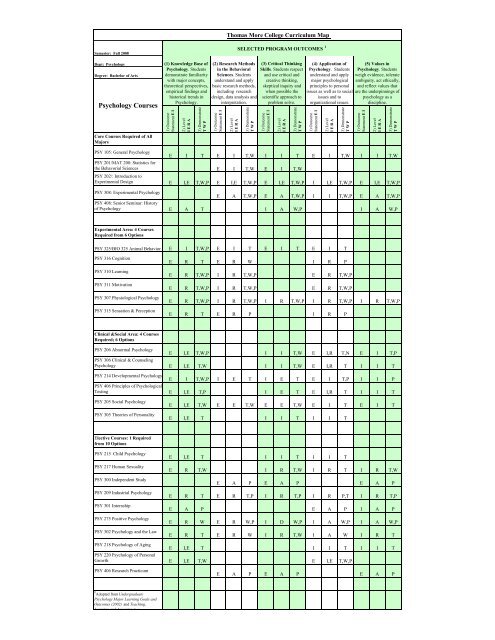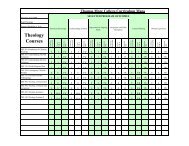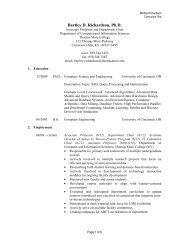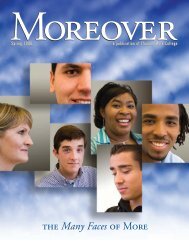Psychology Curriculum Map 8.08 - Thomas More College
Psychology Curriculum Map 8.08 - Thomas More College
Psychology Curriculum Map 8.08 - Thomas More College
You also want an ePaper? Increase the reach of your titles
YUMPU automatically turns print PDFs into web optimized ePapers that Google loves.
<strong>Thomas</strong> <strong>More</strong> <strong>College</strong> <strong>Curriculum</strong> <strong>Map</strong><br />
Semester: Fall 2008<br />
Dept: <strong>Psychology</strong><br />
Degree: Bachelor of Arts<br />
<strong>Psychology</strong> Courses<br />
Core Courses Required of All<br />
Majors<br />
(1) Knowledge Base of<br />
<strong>Psychology</strong>. Students<br />
demonstrate familiarity<br />
with major concepts,<br />
theoretical perspectives,<br />
empirical findings and<br />
historical trends in<br />
<strong>Psychology</strong>.<br />
1) Outcome<br />
Statement E I<br />
2) Level<br />
I E R A<br />
3) Demonstrate<br />
T W P<br />
(2) Research Methods<br />
in the Behavioral<br />
Sciences. Students<br />
understand and apply<br />
basic research methods,<br />
including research<br />
design, data analysis and<br />
interpretation.<br />
1) Outcome<br />
Statement E I<br />
2) Level<br />
I E R A<br />
SELECTED PROGRAM OUTCOMES 1<br />
3) Demonstrate<br />
T W P<br />
(3) Critical Thinking<br />
Skills. Students respect<br />
and use critical and<br />
creative thinking,<br />
skeptical inquiry and<br />
when possible the<br />
scientific approach to<br />
problem solve.<br />
1) Outcome<br />
Statement E I<br />
2) Level<br />
I E R A<br />
3) Demonstrate<br />
T W P<br />
(4) Application of<br />
<strong>Psychology</strong>. Students<br />
understand and apply<br />
major psychological<br />
principles to personal<br />
issues as well as to social<br />
issues and to<br />
organizational issues.<br />
1) Outcome<br />
Statement E I<br />
2) Level<br />
I E R A<br />
3) Demonstrate<br />
T W P<br />
(5) Values in<br />
<strong>Psychology</strong>. Students<br />
weigh evidence, tolerate<br />
ambiguity, act ethically,<br />
and reflect values that<br />
are the underpinnings of<br />
psychology as a<br />
discipline.<br />
1) Outcome<br />
Statement E I<br />
2) Level<br />
I E R A<br />
3) Demonstrate<br />
T W P<br />
PSY 105: General <strong>Psychology</strong><br />
E I T E I T,W I I T E I T,W I I T.W<br />
PSY 201/MAT 208: Statistics for<br />
the Behavorial Sciences E I T,W E I T,W<br />
PSY 202/: Introduction to<br />
Experimental Design E I,E T,W,P E I,E T,W,P E I,E T,W,P I I,E T,W,P E I,E T,W,P<br />
PSY 308: Experimental <strong>Psychology</strong><br />
E A T,W,P E A T,W,P I I T,W,P E A T,W,P<br />
PSY 408: Senior Seminar: History<br />
of <strong>Psychology</strong> E A T I A W,P I A W,P<br />
Experimental Area: 4 Courses<br />
Required from 6 Options<br />
PSY 325/BIO 325 Animal Behavior E I T,W,P E I T E I T E I T<br />
PSY 316 Cognition<br />
PSY 310 Learning<br />
PSY 311 Motivation<br />
PSY 307 Physiological <strong>Psychology</strong><br />
PSY 315 Sensation & Perception<br />
E R T E R W I R P<br />
E R T,W,P I R T,W,P E R T,W,P<br />
E R T,W,P I R T,W,P E R T,W,P<br />
E R T,W,P I R T,W,P I R T,W,P I R T,W,P I R T,W,P<br />
E R T E R P I R P<br />
Clinical &Social Area: 4 Courses<br />
Required; 6 Options<br />
PSY 206 Abnormal <strong>Psychology</strong><br />
E I,E T,W,P I I T,W E I,R T,N E I T,P<br />
PSY 306 Clinical & Counseling<br />
<strong>Psychology</strong> E I,E T,W I I T,W E I,R T I I T<br />
PSY 214 Developmental <strong>Psychology</strong><br />
E I T,W,P I E T I E T E I T,P I I P<br />
PSY 406 Principles of Psychological<br />
Testing E I,E T,P I E T E I,R T I I T<br />
PSY 205 Social <strong>Psychology</strong><br />
PSY 305 Theories of Personality<br />
E I,E T,W E E T,W E E T,W E I T E I T<br />
E I,E T I I T I I T<br />
Elective Courses: 1 Required<br />
from 10 Options<br />
PSY 215 Child <strong>Psychology</strong><br />
PSY 217 Human Sexuality<br />
PSY 300 Independent Study<br />
PSY 209 Industrial <strong>Psychology</strong><br />
PSY 301 Internship<br />
PSY 275 Positive <strong>Psychology</strong><br />
PSY 302 <strong>Psychology</strong> and the Law<br />
E I,E T I I T I I T<br />
E R T,W I R T,W I R T I R T,W<br />
E A P E A P E A P<br />
E R T E R T,P I R T,P I R P,T I R T,P<br />
E A P E A P I A P<br />
E R W E R W,P I D W,P I A W,P I A W,P<br />
E R T E R W I R T,W I A W I R T<br />
PSY 218 <strong>Psychology</strong> of Aging<br />
E I,E T I I T I I T<br />
PSY 220 <strong>Psychology</strong> of Personal<br />
Growth E I,E T,W E I,E T,W,P<br />
PSY 406 Research Practicum<br />
E A P E A P E A P<br />
1 Adopted from Undergraduate<br />
<strong>Psychology</strong> Major Learning Goals and<br />
Outcomes (2002) and Teaching,<br />
Learning and Assessing in a
<strong>Thomas</strong> <strong>More</strong> <strong>College</strong><br />
<strong>Curriculum</strong> <strong>Map</strong>s Legend<br />
1. OUTCOME STATEMENT (Column 1):<br />
The program outcome is (E) EXPLICITY or (I) IMPLICITLY stated in the course syllabus as being one of learning outcomes for this<br />
course.<br />
2. LEVEL OF CONTENT DELIVERY (Column 2):<br />
(I) INTRODUCES- Students are not expected to be familiar with the content or skill at the collegiate or graduate level. Instruction and<br />
learning activities focus on basic knowledge, skills, and/or competencies and an entry-level complexity.<br />
(E) EMPHASIZES- Students are expected to possess a basic knowledge and familiarity with the content or skills at the collegiate or<br />
graduate level. Instruction and learning concentrates on enhancing and strengthening knowledge, skills, and expanding complexity.<br />
(R) REINFORCES- Students are expected to possess a strong foundation in the knowledge, skill, or competency at the collegiate or<br />
graduate level. Instructional and learning activities continue to build upon previous competencies and increased complexity.<br />
(A) APPLIES- Students are expected to possess an advanced level of knowledge, skill, or competency at the collegiate or graduate<br />
level. Instructional and learning activities focus on the use of the content or skills in multiple contexts and at multiple levels of<br />
complexity.<br />
3. DEMONSTRATION OF LEARNING (Column 3):<br />
Students are asked to demonstrate their learning on the outcome through tests (T), written work (W), oral presentations (O), and/or<br />
projects (P) and are provided with formal feedback. In some cases, individual departments have tailored this legend to include<br />
discipline-specific learning outcomes.










![MOREOVER [Fall 2011] - Thomas More College](https://img.yumpu.com/4921303/1/190x245/moreover-fall-2011-thomas-more-college.jpg?quality=85)

